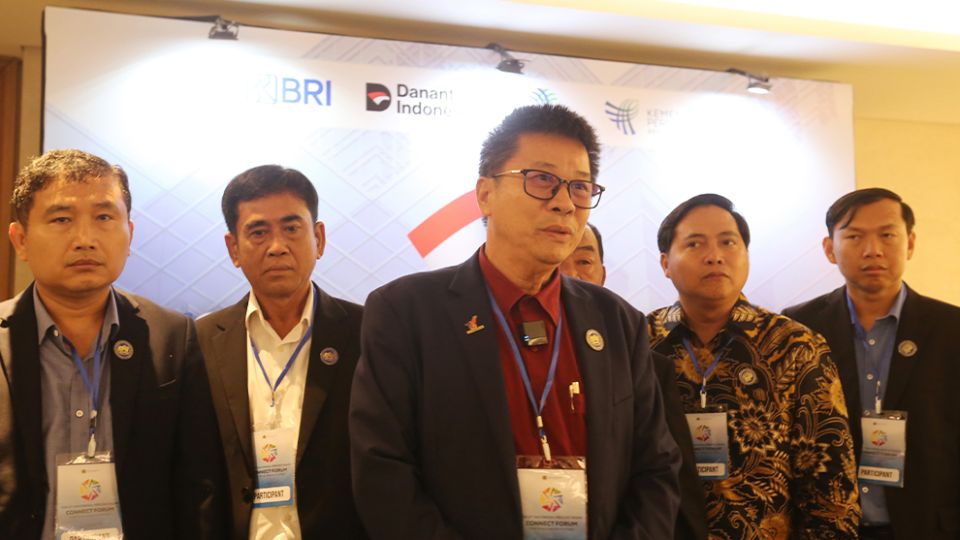October 21, 2025
BANGKOK – Cambodia’s small and medium enterprises (SMEs) are urging Indonesian investors to channel resources directly into Cambodia’s industrial and production sectors rather than focusing solely on exporting goods, amid an ongoing boycott of Thai products by local consumers.
Vann Sokheng, president of the Federation of Associations for Small and Medium Enterprises of Cambodia (FASMEC), shared his encouragement during the Indonesia Trade Expo 2025, held in Jakarta from October 15 to 19.
The event featured over 1,600 exhibitors and drew more than 8,000 registered buyers from 130 countries.
Leading a 25-member Cambodian business delegation to the fair, Sokheng said the mission was not just about exploring imports but about “attracting real investors” to Preah Sihanouk — a province now emerging as a regional investment hub.
“We are here to attract investors to Preah Sihanouk. Our main goal is to create more jobs for our people, increase domestic production, reduce imports and boost exports,” Sokheng told The Post.
He added that while Cambodia has long been a major importer, the benefits to the local economy remain limited.
“When we only import, we gain little more than commissions,” he said.
“But when investors come directly, the benefits multiply — through job creation, technology transfer and export growth,” he added.
Sokheng also urged the Cambodian government to consider providing incentives to foreign and local investors to revive stalled buildings and underdeveloped areas in Sihanoukville.
He noted that Cambodia remains a favorable destination for investors due to its stable geography, absence of major natural disasters such as earthquakes or typhoons, and improving business climate.
“This is an opportunity for FASMEC members to go abroad to find development partners for our country,” he said.
The call for Indonesian investment coincides with a growing wave of public boycotts against Thai products in Cambodia, following tensions and perceived aggression from the neighbouring kingdom.
Sokheng said the movement has heightened demand for goods from alternative sources — particularly local and regional partners such as Indonesia.
“Nationalist activities cannot be done alone,” he stressed.
“We must unite to form an economic community and consume what we produce. That’s why we have a new proverb — we are producers, we are sellers and we are consumers,” he explained.
FASMEC, he added, welcomes both domestic and international business partners, providing assistance and confidence-building measures to strengthen Cambodia’s trade ecosystem.
Indonesian ambassador to Cambodia Santo Darmosumarto, who also attended the Jakarta trade fair, praised Cambodia’s growing engagement and said such participation lays the foundation for future investment.
“Investment follows trade,” the ambassador said.
“You first start with interactions — interactions become friendships, friendships become trade, and trade opens opportunities for potential investment,” he noted.
He emphasized that Indonesia’s trade fairs, especially those highlighting small and medium enterprises, are “highly suitable” for Cambodian market conditions, where purchasing volumes are moderate but steadily expanding.
“I am very pleased to see FASMEC’s active presence here,” he said, adding “It shows that Cambodian and Indonesian SMEs are ready to engage directly, building business bridges between our two economies.”
Bilateral trade between Cambodia and Indonesia reached approximately $1.09 billion in 2023, marking a 15 per cent increase from the previous year.
Cambodia’s exports, while relatively small at $92.74 million, surged by 152 per cent, whereas imports climbed by 9.1 per cent, to around $994.6 million.
From January to September 2025, total trade between the two countries stood at $795 million, with Indonesia ranking 11th among Cambodia’s trading partners, according to the Ministry of Economy and Finance’s General Department of Customs and Excise.
As Cambodian SMEs push for deeper engagement beyond trade, FASMEC hopes Indonesia’s growing presence in Sihanoukville will move from shipping goods to setting up factories — turning commerce into long-term partnership.


